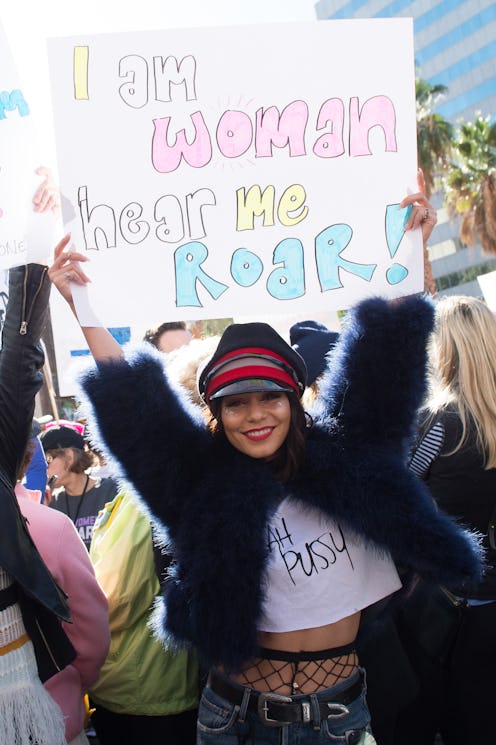As feminism has gotten more popular and mainstream, some anti-feminists have also unfortunately become very vocal and hostile. And although "feminism" may not be looked upon as a dirty word quite as much these days, but an awful lot of derogatory terms used toward feminists are still alive and well. Most feminists have heard them, and many have even been called them — both of which show that feminism is as necessary now as ever. When a culture is rife with negative terms for people who advocate for gender equality, that's a sign that an unfortunate number of people still believe in gender inequality.
The persistent belief in negative stereotypes about feminists might continue for any number of reasons. Some people may be attached to traditional gender role; others may feel guilty about being on the privileged side of things; and still others may hold misconceptions about feminism — for example, that feminism hurts men (even though its goal is to liberate people of all genders) or that only women can be feminists (anyone can be a feminist).
Another source of negative beliefs about feminists is the anti-feminist propaganda people see used everywhere from the news media to social media, much of which uses terms like these ones. They may not all seem harmful, but they ultimately hold back not only perceptions of feminism but also the movement itself.
1. "Radical"
When people learn I'm a feminist, they'll sometimes say something like, "You're not one of those radical feminists, are you?" I personally don't think this word should be an insult. "Radical" is sometimes used to mean "extreme" or even "violent," but in the context of feminism, it means "dealing with roots." Radical feminism seeks to get to the root causes of gender inequality. People may disagree on what these causes are — some may say it's the class system, for example, while some may say it's the gender binary — but regardless, what it means is that feminism doesn't just mean giving women rights; it means restructuring society. And there's nothing extreme or violent about that.
2. "Militant"
Similar to "radical," "militant" is sometimes used to connote an aggressive feminist. In addition to dismissing feminist ideas as extreme, it also plays into the stereotype that feminists are a) masculine and b) angry. Being angry about gender inequality is actually very justified (and just a reminder that there's nothing wrong with presenting or being masculine, just as there's nothing wrong with presenting or being feminine), but the stereotype of the militant feminist would have it that we're all just screaming at everybody for no reason. It's an incredibly convenient way to avoid considering that we may be worth listening to.
3. "Man-Hating"
It's difficult to advocate for gender equality without somebody trying to make it about men, by saying "not all men" mistreat women (we know), by asking why we aren't paying attention to men's issues (we are), or by claiming that feminists hate men. These types of complaints detract from the real issue — that our system of gender oppresses people of all genders, particularly women and gender minorities — and invalidates feminists who are talking about very real injustices they've experienced. Feminists do not hate men; they hate the patriarchy (which, by the way, hurts men, too).
4. "Social Justice Warrior"
When I first heard this term, I thought it was positive. Who would have a problem with people fighting for social justice? But, apparently, that's a bad thing to some people. The term "social justice warrior" is used to stereotype people who are advocating for any social cause, including feminism, as irrational and obsessed with looking for evidence of inequality, as if it's not already there. But it is. People accused of being social justice warriors aren't just making things up; they're calling attention to problems that others may not observe because of their privilege.
5. "PC Police"
"Political correctness" has gotten a bad reputation. People who advocate the use of sensitive language are frequently accused of being the "PC police," as if they're trying to get other people in trouble. But that's not the goal. The goal is to create spaces where people of all identities feel heard and validated, and our language as it stands creates spaces where certain perspectives are valued above others. Calling feminists the "PC police," like any of these terms, is a way to detract from the fact that they might actually have a point — and that's why these terms are both so powerful and so harmful.
Images: Giphy (2)
